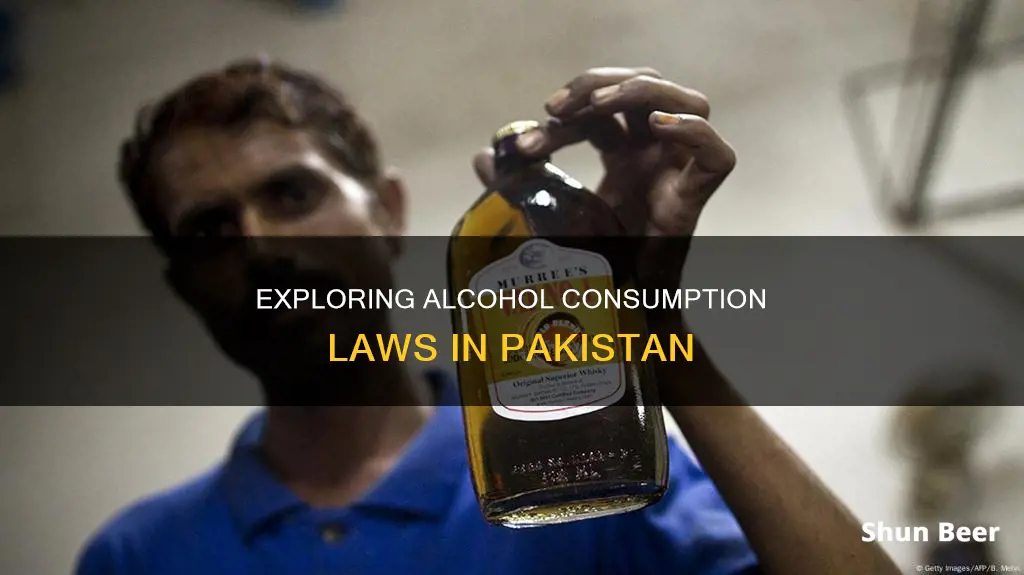
Drinking alcohol is prohibited in Pakistan, an Islamic country, where alcohol consumption is forbidden for Muslims as it is considered wicked. However, non-Muslims and foreigners with a government permit can sell and consume alcohol, but only in private settings. Non-Muslims drinking alcohol is frowned upon in Pakistani society and is considered taboo. The consumption of alcohol in Pakistan is done in private, and drinking in public is uncommon.
| Characteristics | Values |
|---|---|
| Legality of drinking alcohol in Pakistan | Illegal for Muslims, legal for non-Muslims with a permit |
| Alcohol consumption in Pakistani society | Frowned upon, considered taboo and carries a social stigma |
| Availability of alcohol | Sold in designated stores, available on the black market and through bootleggers |
| Enforcement of alcohol laws | Strict, with serious consequences for those who violate them |
| Availability of beer | Sold in restaurants in five-star hotels and specialty shops |
| Price of domestic beer | Rs. 150 – 200 ($1.75 – $2.35) |
| Price of imported beer (Heineken) | Rs. 500 ($5.80) |
What You'll Learn
- Beer and liquor are the most common alcoholic drinks in Pakistan
- Alcohol is expensive in Pakistan, so social drinking is limited to the middle and upper classes
- Non-Muslims can buy alcohol with a permit, which is issued by the Excise and Taxes Department
- Foreigners can also apply for alcohol permits, but drinking is done in private
- Alcohol is legally served to non-Muslims in restaurants in five-star hotels

Beer and liquor are the most common alcoholic drinks in Pakistan
Pakistan is an Islamic country, and as such, the consumption of alcohol is prohibited. The sale of alcohol was banned in the mid-1970s, and since then, the majority Muslim population has been unable to legally purchase alcohol. However, despite the strict laws, alcohol consumption still occurs, especially in private settings.
For non-Muslims, there are a few options for obtaining alcohol. Non-Muslim foreigners can order alcohol in licensed restaurants and hotels, and they can also apply for alcohol permits. Additionally, alcohol can be purchased at certain five-star hotels and specialty shops in some provinces. However, it is important to note that drinking is not a public activity and is generally frowned upon in Pakistani society.
The availability of alcohol in Pakistan also extends to the black market, where domestic and imported products can be purchased. There is also a large network of illegal brewers who produce homemade alcohol. However, consuming this type of alcohol is dangerous and has led to many deaths and serious injuries such as blindness.
It is worth noting that the consumption of alcohol in Pakistan is surrounded by a certain level of ambiguity. While it is prohibited for Muslims, there are exceptions for non-Muslims and foreigners. Additionally, the enforcement of these laws can vary, and the social stigma associated with alcohol use may differ depending on the region and cultural background.
Beer Tube Screens: How Do They Work?
You may want to see also

Alcohol is expensive in Pakistan, so social drinking is limited to the middle and upper classes
In 1977, the populist government of Zulfikar Ali Bhutto prohibited the sale of alcohol in Pakistan. This was in response to an increase in the population's usage of alcohol and a violent protest campaign led by an alliance of right-wing religious groups and other anti-Bhutto forces. The ban was strengthened in 1979 under the Islamic regime of General Zia-ul-Haq, who declared drinking alcohol to be "un-Islamic" and imposed severe punishments for selling alcohol to Muslims.
Despite the ban, alcohol is still widely consumed in Pakistan, and the country's oldest and largest brewery, Murree Brewery, continues to do a roaring trade. The prohibition has led to a thriving black market, with bootleggers and illegal brewers meeting the demand for alcohol.
The high prices of alcohol in Pakistan mean that social drinking is largely limited to the middle and upper classes. Those with lower incomes often turn to cheap, illegally produced moonshine, which can be dangerous and lead to serious health problems. During the coronavirus pandemic, the stress on supplies caused by the closure of the Murree Brewery for several weeks, as well as increased demand, led to a surge in alcohol prices.
In the southern province of Sindh, non-Muslims can buy alcohol from licensed "wine shops". However, even in Sindh, it is common for wine shop workers to deliver alcohol to anyone who can pay, regardless of their religion. In the rest of Pakistan, Muslim drinkers rely on the black market, where imported brand-label liquor is often watered down.
Vintage Beer: Drinking Beer from 1996 and Beyond
You may want to see also

Non-Muslims can buy alcohol with a permit, which is issued by the Excise and Taxes Department
Pakistan is an Islamic country that follows Islamic rules and regulations, so the consumption of alcohol is prohibited. Alcohol consumption is forbidden for Muslims as it is considered wicked. However, non-Muslims are permitted to consume alcohol in Pakistan with a permit issued by the Excise and Taxes Department of the provincial government. This permit is only valid for a limited time and allows non-Muslims to purchase a limited amount of alcohol, usually 100 bottles of beer or 5 bottles of liquor per month. It is important to note that non-Muslims may consume alcohol in private settings only and not in public.
The process of obtaining an alcohol permit for non-Muslims in Pakistan involves submitting the required documents and following specific procedures. For non-Muslim foreigners and tourists, the application process typically includes submitting an application form, paying a permit fee, and providing a copy of a valid passport. This can be done by visiting the Excise and Taxation Officer or Prohibition Officer of the district. The permit allows foreigners to purchase alcohol from designated stores and consume it within the permitted limits.
In addition to obtaining a permit, non-Muslims in Pakistan should be aware of the cultural norms and restrictions surrounding alcohol consumption. It is considered taboo and frowned upon by society. Alcohol consumption is generally done in private, and it is not common to see alcohol served at weddings or parties. Those who violate the strict alcohol laws in Pakistan may face serious consequences. It is important to respect local traditions and customs and to avoid causing discomfort to the locals.
When consuming alcohol in Pakistan, it is advisable to purchase alcohol from licensed establishments rather than local vendors, as homemade alcohol can be dangerous and lead to serious health issues. Alcohol is typically more accessible in major cities, and it is served to non-Muslims at restaurants in five-star hotels. These hotels also have small shops that sell beer and liquor, usually located at the back and operating for limited hours.
While the Pakistani government has made allowances for non-Muslims to purchase and consume alcohol, it is important to respect the cultural and religious sensitivities surrounding alcohol in the country. Adhering to the laws, norms, and restrictions is crucial to avoid any legal or social repercussions.
Beer's Anti-Inflammatory Benefits: Fact or Fiction?
You may want to see also

Foreigners can also apply for alcohol permits, but drinking is done in private
Pakistan is an Islamic country, and as such, the consumption of alcohol is prohibited. The sale of alcohol was banned in the mid-1970s, and since then, the majority Muslim population has been unable to legally purchase alcohol.
However, foreigners can apply for an alcohol permit, allowing them to purchase a limited amount of alcohol per month. This permit can be obtained from the Excise and Taxation Officer/Prohibition Officer of the district, and requires the submission of a filled-out application form, a copy of a valid passport, and a permit fee. With this permit, foreigners can purchase alcohol from designated shops and certain hotels. It is important to note that alcohol consumption, even for foreigners with permits, is restricted to private settings and is strictly prohibited in public places.
The availability of alcohol in Pakistan is limited, and drinking culture is largely confined to private house parties. Alcohol is also expensive, so social drinking is typically limited to the middle and upper classes. It is not uncommon for foreigners to be offered drinks by locals, who may assume that they will want to take advantage of any opportunities to drink. However, it is important to be cautious when accepting drinks, as homemade alcohol has been linked to several deaths and injuries in the country.
While Pakistan has strict laws prohibiting alcohol consumption for Muslims, there may be a small minority of Muslims who still drink, particularly those from more affluent backgrounds who can afford imported alcohol. However, drinking among Muslims is generally frowned upon and considered taboo in Pakistani society.
The Knockout Beer Bong: How Does It Work?
You may want to see also

Alcohol is legally served to non-Muslims in restaurants in five-star hotels
Pakistan is an Islamic country, and as such, the consumption of alcohol is prohibited. This was not always the case, however, as after independence in 1947, Pakistani law was fairly liberal regarding liquor laws. This changed in the mid-1970s when the Bhutto government introduced prohibition for Muslim citizens.
Non-Muslims and foreigners with a special government permit are allowed to consume and sell alcohol. This permit is issued by the Excise and Taxes Department of the province's government and is only valid for a limited time. Non-Muslims may consume alcohol in private settings only; it is forbidden in public.
Alcohol is also served to non-Muslims in restaurants located within five-star hotels. These hotels also usually have a small shop where beer and liquor are sold. These shops tend to be located at the back of the hotel, are only open for a few hours a day, and are closed on Fridays.
While foreigners can sometimes buy alcohol without a permit, it is recommended that those staying in the country for longer periods apply for a permit to avoid bureaucratic hassles. The permit can be obtained from the office of the Excise and Taxation office in sector F8 Islamabad.
It is important to note that drinking alcohol is frowned upon in Pakistani society and is considered taboo, even for non-Muslims. Pakistan's alcohol consumption laws are strictly enforced, and violators face serious consequences. Therefore, it is crucial to respect local traditions and customs when visiting Pakistan and refrain from doing anything that may be considered offensive or inappropriate by the locals.
The Science Behind Beer Koozies: Do They Really Work?
You may want to see also
Frequently asked questions
No, the consumption of alcohol is prohibited in Pakistan.
Non-Muslims and foreigners with a government permit can consume and purchase alcohol in Pakistan. However, they can only drink in private settings and must obtain a permit from the Excise and Taxes Department of the province government.
Beer can be purchased at restaurants in five-star hotels and specialty shops in other provinces. In Punjab and Islamabad, beer can be bought at the following hotels: Pearl Continental, Holiday Inn, Avari, Pearl Continental Rawalpindi, Ramada Multan, Serena Faisalabad, and Pearl Continental Bhurban.
No, drinking alcohol is not a public activity in Pakistan and is frowned upon by society. Drinking only takes place in private.
Pakistan's alcohol consumption laws are strictly enforced, and those who violate them face serious consequences. While the punishment for drinking alcohol is unclear, it was previously 80 lashes, and anyone who provides alcohol to a Muslim can be sentenced to prison.







